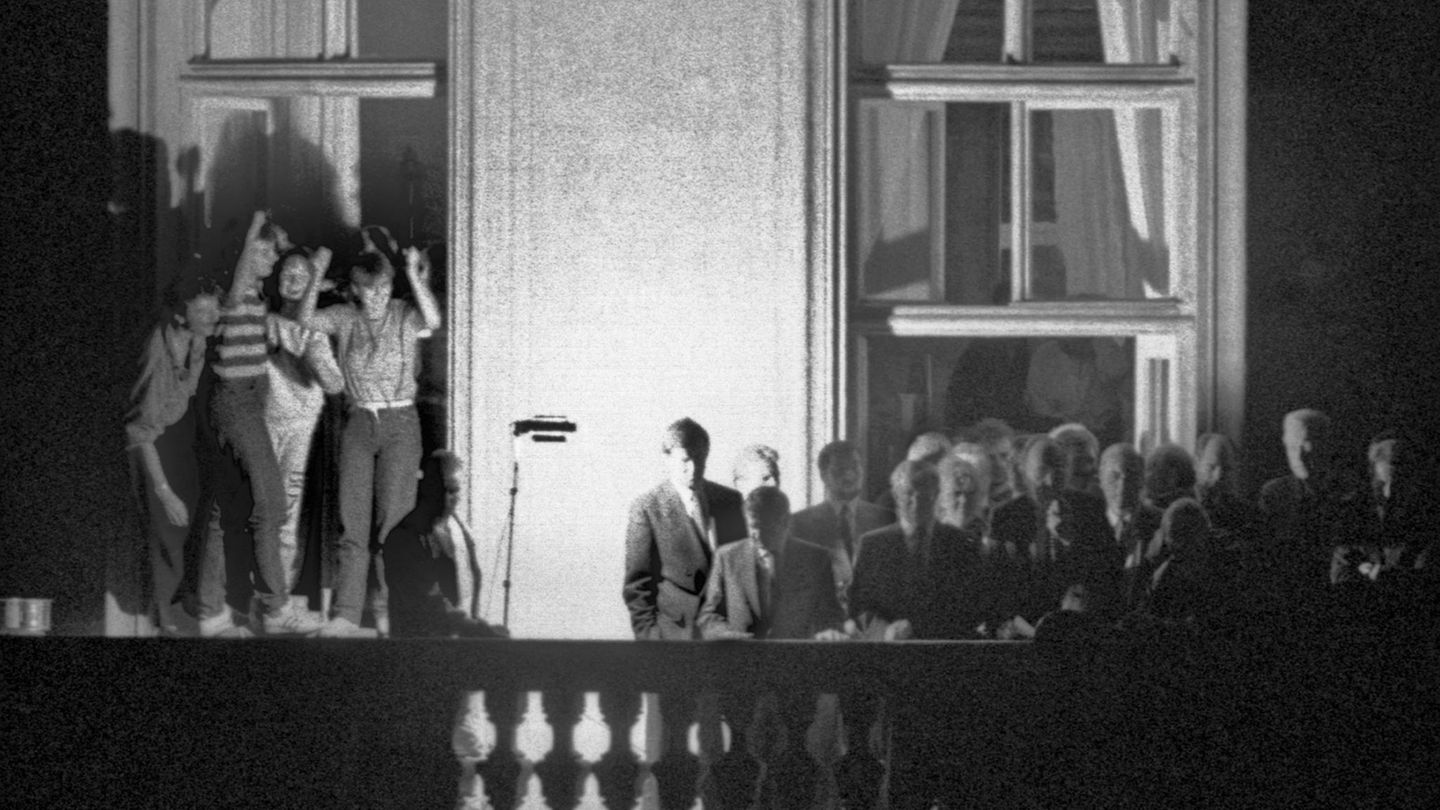Hans-Dietrich Genscher’s historic speech on the Prague embassy balcony brought freedom to thousands – and was only shown on TV thanks to the presence of mind of two men.
“We have come to you to inform you that today your departure…” The rest was joy and goosebumps, world history and freedom. It was exactly 35 years ago, on September 30, 1989 at 6:58 p.m., when Federal Foreign Minister Hans-Dietrich Genscher stepped onto the balcony of the Lobkowitz Palace, the headquarters of the German Embassy in Prague, and said his historic sentence. “… to the Federal Republic of Germany has become possible”he went on – but no one heard that anymore. There are quite a few people who see the words spoken in the pale light as another nail in the coffin for the moribund GDR.
The importance is also due to the fact that it was not only the approximately 4,000 GDR refugees, some of whom had been waiting in the completely overcrowded embassy grounds for weeks, who heard Genscher’s redeeming promise. The FDP politician’s words found their way from the Prague balcony via television into West and, above all, East German living rooms. Thousands of men, women and children then made their way from the self-proclaimed workers’ and farmers’ state to Prague, the capital of Czechoslovakia that promised freedom. The power of the SED dictatorship continued to erode.
Hans-Dietrich Genscher’s balcony speech went around the world
The fact that Genscher’s speech was able to go around the world was thanks to a television team from ZDF; specifically due to the instinct of the cameraman Stephan Radke and the presence of mind of his sound engineer – because the iconic sequence almost never came about. In 1989, ubiquitous cell phone cameras weren’t even a thing of the future.
On the occasion of the 30th anniversary of the speech five years ago, Radke was in demand. On ZDF, among others, he tells us what it was like on September 30, 1989, and how he managed to get the historic recording. Normally there were always statements from Ambassador Hermann Huber in front of the main entrance to the Palais Lobkowitz, where the other television teams from all over the world were waiting. “I had the feeling that if something happened, it would happen where the people were, in the back of the garden.” There was a power station there from which you could see the area. “I climbed up to this house using a crook’s ladder, I put the camera on the tripod and I was just able to press the shutter button. Then a light turned on on that balcony, Genscher stepped out and spoke these words.”
75 years of the Basic Law
Bundeswehr, reunification, asylum law: The most important changes to the Basic Law
So that it wasn’t just images, but also the sound could be captured, the Austrian sound man had to react just as quickly – and he did. The camera microphone alone would not have been enough, the former cameraman reported “Leipziger Volkszeitung” (LVZ). With sound and images in their luggage, they then went to the hotel in the evening, the sensational recording was broadcast to the ZDF broadcasting center in Mainz – and from there reached German living rooms. The rest is history – and goosebumps.
“Pictures that made world history”
That same evening, the first trains left Prague for the Federal Republic; Hans-Dietrich Genscher had previously negotiated this with the GDR leadership. The condition of East Berlin: The trains had to travel across the territory of the GDR. West German government officials were in the wagons to calm the agitated refugees.
When the trains stopped in the Bavarian courtyard on the morning of October 1st, tears flowed. Fear and uncertainty gave way to joy of freedom and relief. In the following weeks, thousands more GDR citizens came to the West this way. On November 9th, the wall fell and the last chapter of the GDR began.
“Actually, they are modest shots that didn’t work any better in the dark”remembered cameraman Radke 30 years later in the LVZ. “But they were pictures that made a bit of world history.”
Editor’s note: This article first appeared on the occasion of the 30th anniversary of Genscher’s speech on September 30, 2019.
Sources: ZDF, ,
Source: Stern
I have been working in the news industry for over 6 years, first as a reporter and now as an editor. I have covered politics extensively, and my work has appeared in major newspapers and online news outlets around the world. In addition to my writing, I also contribute regularly to 24 Hours World.




